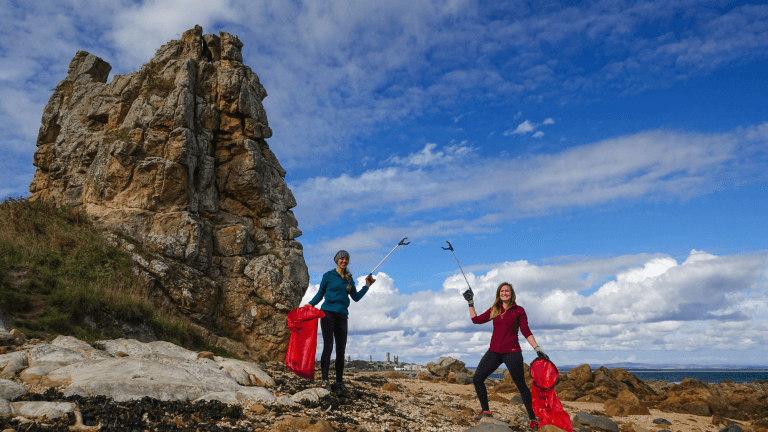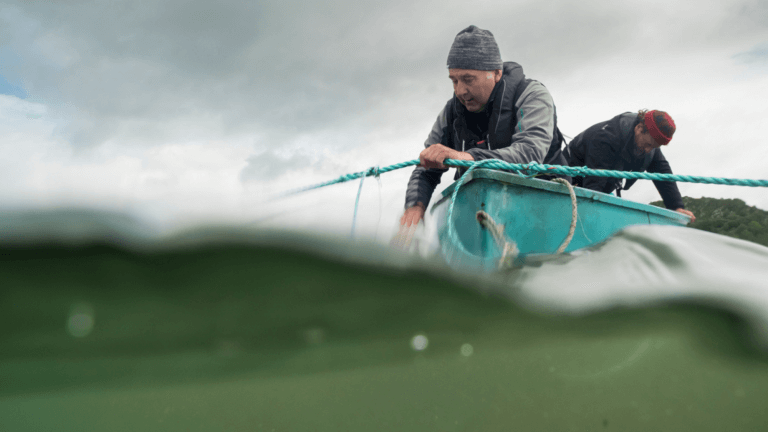The Opportunity
SMEEF is designed to access NEW money for marine environmental enhancement. We are reaching out to ALL sectors, and their supply chains, who make use of, or have an interest in, the Scottish marine environment and asking them to contribute to our grant pot.
SMEEF presents an unique opportunity to:
- Boost the health of our seas, enabling users benefiting from the rich natural marine resource to reinvest in the natural capital so important to them.
- Support sustainable growth whilst demonstrating businesses commitment to healthier seas.
- Build a stronger wellbeing economy for Scotland’s coastal communities and visitors by increasing community capacity to deliver habitat enhancement and improve resilience in the face of climate change.
As a donor you will be invited to be part of the Contributors’ Forum where you can discuss issues of relevance and share your knowledge with SMEEF. We will also feature your logo on our website and reference you in our regular newsletters and in relevant media. You will receive regular updates on progress and we will also be happy to present to your key stakeholders about our work and what your contribution is helping to achieve.


Get Involved
SMEEF needs businesses to come forward and contribute to the grant pot.
SMEEF will provide your company with:
- Access to a trustworthy and transparent grant management programme,
- Unparalleled expertise to drive the programme of enhancement projects,
- Capacity to make it happen.
SMEEF is uniquely placed to ensure the greatest positive impact for nature and people. Get in touch now to discuss how your business can become involved.
Contributions Acceptance Policy - Summary
Ethical Contributions Policy
SMEEF believes that harnessing the power of the private sector and philanthropy is crucial if we are to achieve greatest impact for marine and coastal ecosystem recovery in Scotland. However, it is important that all parties involved with SMEEF are protected from any real or perceived impropriety through the offer or receipt of a contribution. To do this SMEEF undertakes a risk-based approach to due diligence.
SMEEF welcomes proposed contributions from any person or business with an interest in restoring the Scottish marine environment. Our Contributions Acceptance Policy sets out the terms of our acceptance and refusal of contributions to ensure they are in line with our core aims and do not compromise or create a risk to our own or our partners’ reputation, financial position or brand.
This policy is subject to at least annual review and can be updated without notice.
1.1 SMEEF will therefore seek philanthropic support in the form of annual or fixed payments, multiyear contributions or profit share, from anyone with an interest in the health of the Scottish marine and coastal environment, including from individuals, trusts, foundations, and corporates in the UK and abroad.
1.2 We have a clear and rigorous contributions acceptance process which requires assessment by the Ethical Contributions Board and agreement by the SMEEF Steering Group. We report to donors regularly including during the Contributors Forum and via the annual Impact Report.
1.3 It is vital that contributions to SMEEF do not create influence (real or perceived) upon Steering Group members and their organisations (NatureScot, Scottish Governments Marine Directorate and Crown Estate Scotland), their processes or standards, including upon the outcomes and advice given relating to licences/marine applications etc.
1.4 In order to limit the risk associated with accepting contributions from 3rd parties, SMEEF will take all reasonable measures to:
- Ensure it is aware of the source of funding for proposed contributions;
- Undertake due diligence to ensure that contributions are for purposes consistent with SMEEF’s mission and that no legal or reputational issues are raised by their acceptance;
- Be cognisant of SMEEF’s and NatureScot’s responsibilities under anti-money laundering, anti-terrorist financing legislation and international sanctions legislation; such as the Criminal Finances Act 2017; the Proceeds of Crime Act 2002; the Terrorism Act 2000; the Money Laundering, Terrorist Financing and Transfer of Funds Regulations 2017; and the Bribery Act 2010;
- Ensure the timing of a contribution could not be construed as influencing or having influenced (for example) a licencing or application outcome, or a procurement process.
1.5 SMEEF will maintain an appropriate and auditable record of contributions and contributors (individual, trust or corporate).
1.6 Contributors can expect to receive appropriate acknowledgement, including being listed on the SMEEF website.
1.7 Funds will not be transferred out of SMEEF and will only be used for the purposes set out above. An agreed percentage of contributions will be used to cover overheads and any dedicated resources needed for delivery. This will be agreed in advance with the donor.
2.1 The SMEEF Contributions Acceptance Policy requires us to undertake suitable levels of due diligence on proposed contributors to the fund. Our tests, included below, align to Scottish Government’s policies and standards regarding responsible investment and route to net zero/just transition, and also include consideration of adverse media coverage in relation to reputational risk. The tests fall into three categories, Standard, Enhanced and Extended Due Diligence.
- Standard Due Diligence – all prospective contributors are subject to standard due diligence. SDD will generally examine only the previous 5 years of publicly available information about the Contributor.
- Enhanced Due Diligence – is used where the Ethical Contributions Board has requested further information. This will mean that checks, including checks on parent companies and controlling persons or beneficial owners, will extend beyond the standard 5 years.
- Extended Due Diligence – applies to all potential contributors from organisations in a high-risk category, including any parties with a controlling interest in, or beneficial ownership of, the potential contributor.
2.2 Examples of higher risk industry sectors
- Fossil fuel extraction
- Energy generation from fossil fuel
- Energy generation from nuclear power
- Animal testing for cosmetic or other non-medical products
2.3 All due diligence assessments are undertaken by SMEEF staff using publicly available information and the Dow Jones Risk and Compliance tool before submission to the Ethical Contributions Board and the Steering Group.
3.1 Contributions will be used by SMEEF to fund grants in the following topic areas:
- General funding – A dynamic funding pot which reacts to issues and needs of the network providing essential support for grantees to underpin the growth and stability of the marine enhancement network,
- Seabed enhancement – encompassing seagrass, native oysters and other seabed species and habitats,
- Coastal enhancement – to encompass saltmarsh, sand dunes and other coastal species and habitats,
- Wider Seas – to encompass all mobile species and deeper seas work,
- Seabirds – all work aiming to benefit seabirds,
- Research – strategic projects in partnership with specialists and academics.
The Ethical Contributions Board retains the right to recommend to the Steering Group restrictions on how contributions are used and/or recognised. Our independently chaired Grants Panel makes recommendations on which projects are awarded grant funds and final decisions are taken by the SMEEF Steering Group.
4.1 Contributions may be returned in line with the Return of Contributions Policy. This includes situations where SMEEF can no longer deliver the agreed activities; where there is a change in circumstances which could lead to reputational damage; or where the contribution was paid by a banking error, in which case notification must be received in writing within 30 days.
5.1 In addition to undergoing assessment by the Ethical Contributions Board, businesses contributing to SMEEF will sign an agreement, which includes a declaration that they agree and undertake to SMEEF and NatureScot that they:
- Have never denied that climate change is caused by anthropogenic forcing, or if they have they have issued a correction or apology.
- Have taken measurable steps in reducing their carbon emissions and are actively seeking a net zero future for their business.
- Have only used carbon offsetting as a last resort to reducing emissions.
- Have taken measurable steps to reduce their impact on the marine environment.
- Have made public their environment policy and their progress against its objectives.
- Follow a evidence-based approach to managing their environmental impact/are compliant with an appropriate action framework such as the Science Based Targets Initiative or similar.
- Have an appropriate Fair Work and Anti-Modern Slavery policy and have policies or mechanisms in place that address human rights obligations. Have taken steps to improve its record and/or provide redress for any prior human rights issues.
- Are aligned with/actively support appropriate campaigns and frameworks such as Drink Aware and Gamble Aware.
- Has not provided SMEEF with any information that is inaccurate, misleading, incorrect or fraudulent.
- Has not committed a Prohibited Act, including:
- offering, giving or agreeing to give to any employee or officer of SMEEF or NatureScot any gift or consideration of any kind as an inducement or reward for: (i) doing or not doing (or for having done or not having done) any act in relation to the obtaining or performance of this Agreement or any other contract with SMEEF of NatureScot; or (ii) showing or not showing favour or disfavour to any person in relation to this Agreement or any other contract with SMEEF of NatureScot;
- entering into this Agreement or any other contract with SMEEF or NatureScot where a commission has been paid or has been agreed to be paid by the Contributor or on its behalf, or to its knowledge, unless before the relevant contract is entered into particulars of any such commission and of the terms and conditions of any such contract for the payment thereof have been disclosed in writing to SMEEF;
- committing any offence: under the Bribery Act 2010; under legislation creating offences in respect of fraudulent acts; or at common law in respect of fraudulent acts in relation to this Agreement or any other contract with SMEEF or NatureScot; or
- defrauding or attempting to defraud or conspiring to defraud SMEEF or NatureScot.
How much do different organisations pay into SMEEF?
The sizes of organisations involved with SMEEF vary considerably and operational issues, mean their ability to pay into the Fund is also variable. All donations to the fund are welcome with the aim of establishing a sustainable rolling fund. We welcome multi-year funding, one off contributions or an agreement based on a percentage of profits.
Photos by ©Marine Conservation Society (Image 1-2) and ©Philip Prince/seawilding.org (Image 3)